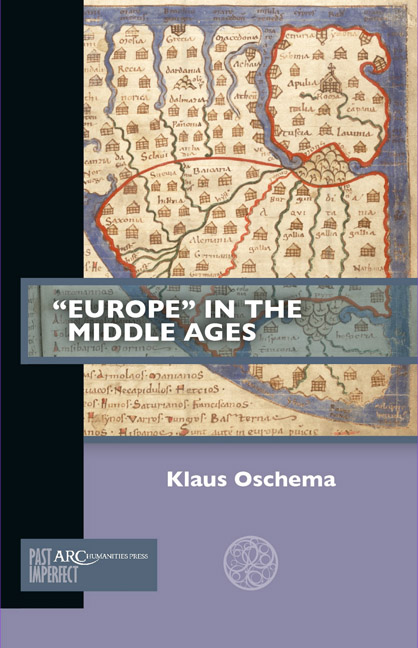Book contents
- Frontmatter
- Contents
- List of Illustrations
- Preface and Acknowledgements
- Chapter 1 Why Europe? A Concept Crossing History and Politics
- Chapter 2 Foundations in Antiquity
- Chapter 3 Moments of Transformation— Europe in the Early Middle Ages
- Chapter 4 Europe, Christianity, or Something Completely Different? Impressions from the Central Middle Ages
- Chapter 5 Our Last Hope? Entangling Europe and Christianity in the Late Middle Ages
- Chapter 6 Perspectives from Outside? Byzantium and the Arabic World
- Conclusion No Roadmap for Europe— History, Politics, and the Way to Global History
- Further Reading
Chapter 6 - Perspectives from Outside? Byzantium and the Arabic World
Published online by Cambridge University Press: 13 February 2024
- Frontmatter
- Contents
- List of Illustrations
- Preface and Acknowledgements
- Chapter 1 Why Europe? A Concept Crossing History and Politics
- Chapter 2 Foundations in Antiquity
- Chapter 3 Moments of Transformation— Europe in the Early Middle Ages
- Chapter 4 Europe, Christianity, or Something Completely Different? Impressions from the Central Middle Ages
- Chapter 5 Our Last Hope? Entangling Europe and Christianity in the Late Middle Ages
- Chapter 6 Perspectives from Outside? Byzantium and the Arabic World
- Conclusion No Roadmap for Europe— History, Politics, and the Way to Global History
- Further Reading
Summary
The overwhelming majority of authors and texts hitherto discussed have pertained to the “Western European” or “Latin” cultural orbit (though a few examples were written in a vernacular language). This does not mean that the notion of Europe was entirely unknown to non-Latin communities. The Greek and the Arabic-Persian spheres were familiar with the word, since they inherited it from Greco-Roman Antiquity, in contrast to cultures in the further Asian East, where the continental structure did not play any perceptible role in their models of the structure of the world. In order to broaden the “Latin-centric” perspective, let us outline, at least briefly, the developments in neighbouring cultures.
Only a limited number of studies have attempted to analyze the use of the word Europe in medieval Greek sources, so the basis for even a superficial comparison remains sketchy and asymmetrical. Even so, many of the more basic traits of the notion's use in the Latin West can also be found in the Greek world. This concerns primarily the geographical foundations that medieval Greek authors inherited equally. In this respect, the most obvious particularity of the Greek tradition is the presence of Europe in a limited regional sense (i.e., as a means of identifying a territory within Greece). This found its more formalized occurrence in the province Europe, which appears for example in Constantine VII Porphyrogenitus's treatise De thematibus. Overall, this more precise and rather technical usage seems to have been less prominent than the more general designation in the well-established triad of Asia, Europe, and Africa (or Libya for the last in most Greek texts).
In recent decades, several studies have emphasized that Greek authors and their texts sometimes express a sense of community between the Greeks and the peoples in the western parts of Europe. While the non-Roman peoples of the north were at first perceived as “barbarians,” the Franks, for example, were accepted by Constantine VII in the tenth century as being more or less on a par with the Romans (i.e., the Byzantines), one indicator being the fact that they intermarried.
- Type
- Chapter
- Information
- 'Europe' in the Middle Ages , pp. 113 - 118Publisher: Amsterdam University PressPrint publication year: 2023

